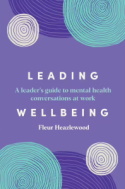Morra Aarons-Mele* says when we allow workers to acknowledge their mental health, they can become more authentic people, employees, and leaders.

Photo: Anshu S.
Alyssa Mastromonaco is no stranger to tough conversations: among other leadership roles, she served as White House Deputy Chief of Staff for Operations under former US President Barack Obama.
So, when she switched to a new antidepressant, she decided to tell her boss.
“I told the CEO that I was on Zoloft and was transitioning to Wellbutrin,” Mastromonaco said.
“I can react strongly to meds, so I was worried switching would shift my mood and wanted her to know why.”
“I talked about it like it was the most normal thing in the world — it is!”
Her boss was supportive.
“You got it,” she said.
When Mastromonaco goes to work, she and her mental health struggles do not part ways at the door.
“You want me,” she said, “you get all of me.”
Mastromonaco brings tremendous talent to her workplace — but she also brings her anxiety.
The same is true for high-performing employees everywhere: one in four adults experiences mental illness each year.
And yet we’re loath to talk about mental health at work.
If we’re feeling emotional at work, our impulse is to conceal it.
We’re hesitant to ask for what we need — flex time, or a day working from home.
Mental illness is a challenge, but it is not a weakness.
When we acknowledge our mental health, we get to know ourselves better, and are more authentic people, employees, and leaders.
Research has found that feeling authentic and open at work leads to better performance, engagement, employee retention, and overall wellbeing.
Failure to acknowledge an employee’s mental health can hurt productivity, professional relationships, and the bottom line.
So what needs to change?
Human capital is the most valuable resource in our economy.
And though much has been done (rightly) to promote diversity at work, there’s a giant hole when it comes to understanding how temperament and sentiment play into the trajectory of success.
As we recognise neurological and emotional diversity in all of its forms, workplace cultures need to make room for the wide range of emotions we experience.
Professional support needs to get better.
We need to have the option to ask for help, and feel safe doing so.
In short, we need more flexibility, sensitivity, and open-mindedness from employers — of the sort they’d give to a broken bone or maternity leave.
We’re not there yet, but some employers are trying to bring conversations about mental health to the forefront.
EY (formerly Ernst and Young) launched a We Care program two years ago to educate employees about mental health issues, encourage them to seek help if they need it, and support colleagues who might be struggling with mental illness or addiction.
They started the program out of a demonstrated need.
Since the advent of the program, 2,000 employees have attended sessions, which always have a senior-level sponsor and a mental health professional on hand.
Someone in leadership kicks it off by sharing their story.
This sends the message that anxiety is not toxic and attendance is not a career-dampener.
“You have to notice first if someone is struggling and ask them if they’re okay,” said Carolyn Slaski, EY America’s Vice Chair of Talent.
“Learn how to listen to their concerns, and then act.”
Other employers offer free onsite counselling sessions to employees and their families, and courses on mental health first aid that teach them how to recognise signs of mental illness in others.
The goal is to empower people to achieve their optimal state of wellbeing.
What such organisations realise is that, given the right support, employees who struggle with their mental health can do great work.
Most people who suffer from chronic anxiety or depression are excellent at faking wellness.
But we never know when an attack might be around the corner.
This is why a work environment that is open and understanding is so important.
Anxiety is a lingering expectation that something bad is going to happen, and if we don’t talk about it, it’s harder to recognise our triggers and learn healthy ways to cope.
But when we do talk about it, we can actually teach ourselves to harness it in ways that play to our strengths.
Times are changing, and people struggling with mental illness, are more likely to get the help they need at work than ever before.
Stew Friedman, Professor at the Wharton School of Business and founding Director of the Wharton Leadership Program, says “the next great sort of liberation movement in our society is about mental illness.”
“Look at the huge growth in wellbeing research, practice in the private sector, and society at large,” he said.
“That’s one really good indicator of change.”
Yet Friedman acknowledges that there are costs to the digital revolution and how it’s affecting communication, identity, and the amount of stress we regularly experience.
“There are trends that are incredibly worrisome,” he said.
“Rates of suicide, depression, anxiety, and drug use are all on the rise.”
“So, our response is clearly inadequate.”
Along with employee assistance programs, conversation and education are fundamental if our goal is to increase understanding and reduce the stigma around mental health.
I have cried in many workplace bathrooms as I cycled between anxiety attacks and clinical depression throughout my career in corporate America.
It never occurred to me that I could share my struggles or create a schedule that allowed me to manage my anxiety.
So, I just quit, over and over again.
Now I know that when an employee leaves a job, the typical cost of replacement is three months of salary.
Think of what the cost is — for the people and the employer — when a whole slice of the population struggles to express their most basic needs.
The burden of depression and anxiety is shared by all members of a workplace, and it’s a vicious cycle.
Change starts with managers and HR professionals recognising the problem and doing something about it.
Because when people get the space and the support they need, it can change their careers, and their lives.
* Morra Aarons-Mele is the founder of Women Online and The Mission List. She tweets at @morraam.
This article first appeared at hbr.org.











